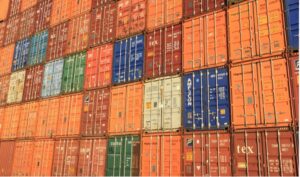Looking to expedite your shipments between China and Canada? Air freight offers a swift and reliable solution for businesses seeking to bridge the Pacific gap. This comprehensive guide delves into the world of air freight from China to Canada, equipping you with the knowledge to optimize your supply chain and navigate the logistics landscape.
Advantages of Air Freight for International Shipping

While sea freight remains a cost-effective option for bulky, non-perishable goods, air freight shines when speed is paramount. Here’s why air freight might be the perfect fit for your business:
- Unmatched Speed: Air freight boasts transit times of 3-7 days, significantly faster than sea freight’s weeks-long journeys. This rapid delivery translates to quicker inventory turnover, improved cash flow, and enhanced customer satisfaction.
- Enhanced Reliability: Air freight schedules are generally more consistent than sea freight, mitigating the risk of delays caused by weather disruptions or port congestion. This predictability allows for better production planning and streamlined logistics.
- Reduced Risk of Damage: Air cargo experiences less handling compared to sea freight, minimizing the potential for damage or loss during transit. This is particularly advantageous for fragile or high-value goods.
- Perishable Goods Delivery: For temperature-sensitive goods with a limited shelf life, air freight is the only viable option. It ensures your products arrive at their destination fresh and ready for sale.
- Global Market Access: Air freight connects you to a wider range of international markets, enabling you to tap into new customer bases and expand your business reach.
Air Freight Process and Key Players Involved
Understanding the air freight process from China to Canada empowers you to make informed decisions. Here’s a breakdown of the key players involved:
- Shipper: The company exporting goods from China.
- Consignee: The company receiving the goods in Canada.
- Freight Forwarder: A logistics company that manages the entire air freight process, including customs clearance, documentation, and cargo booking.
- Airline: The company responsible for transporting the goods by air.
- Customs Broker: A specialist who facilitates the clearance of goods through customs authorities in both China and Canada.
The air freight process typically involves the following steps:

- Booking: The shipper contacts a freight forwarder to discuss their cargo details and secure airfreight space.
- Preparation and Packing: The shipper ensures the goods are properly packaged and labeled according to airfreight regulations.
- Documentation: The freight forwarder prepares essential documents like commercial invoices, packing lists, and certificates of origin.
- Customs Clearance: The freight forwarder facilitates the customs clearance process in both China and Canada.
- Collection and Delivery: The airline collects the cargo from the shipper’s origin and delivers it to the consignee’ destination in Canada.
Factors to Consider When Choosing an Air Freight Service Provider
Selecting the right air freight service provider is crucial for a smooth and cost-effective shipping experience. Consider these factors when making your decision:
- Experience: Opt for a freight forwarder with a proven track record of handling air freight shipments between China and Canada.
- Expertise: Choose a provider with in-depth knowledge of customs regulations for both countries, ensuring efficient customs clearance.
- Network: Look for a freight forwarder with a strong network of partners in China and Canada, facilitating seamless logistics coordination.
- Competitive Rates: Compare quotes from several providers to secure the most cost-effective solution without compromising on service quality.
- Value-Added Services: Consider freight forwarders that offer additional services like cargo insurance, warehousing, and door-to-door delivery for a comprehensive solution.
Documentation and Customs Requirements for Air Freight From China to Canada

Ensuring proper documentation is vital for a smooth customs clearance process. Here are some key documents required for air freight from China to Canada:
- Commercial Invoice: A detailed document outlining the value, description, and quantity of the goods being shipped.
- Packing List: An itemized list of the goods in the shipment, including their weight and dimensions.
- Bill of Lading (BOL): A legal document issued by the airline, serving as a contract of carriage for the shipment.
- Certificate of Origin: A document certifying the country where the goods were manufactured.
- Canadian Customs Broker Power of Attorney: A document authorizing the customs broker to act on your behalf during the clearance process.
It’s crucial to stay updated on the latest customs regulations for both China and Canada, as these can change periodically. Consulting a reputable freight forwarder can ensure you have all the necessary documentation in order to avoid delays at customs.
Understanding Freight Rates and Pricing for Air Shipments
Air freight pricing is a complex matter influenced by several factors:
- Weight and Dimensions: Generally, air freight rates are calculated based on a combination of the gross weight (actual weight of the goods) and volumetric weight (calculated by multiplying the package’s length, width, and height). The higher of these two values determines the final chargeable weight, impacting the cost.
- Origin and Destination Airports: The distance between the origin and destination airports significantly affects the freight rate. Longer distances typically translate to higher costs.
- Fuel Surcharges: Airlines impose fuel surcharges to account for fluctuations in global fuel prices. These surcharges can fluctuate and should be factored into your budget.
- Security Fees: Government-imposed security fees may apply to air cargo shipments.
- Declared Value: The declared value of your goods impacts the cost of cargo insurance, which is often included in the overall freight rate.
- Service Type: The speed of your chosen service (e.g., express vs. standard) influences the price. Faster delivery options typically come at a premium.
Incoterms (International Commercial Terms): These internationally recognized terms of sale clarify the responsibilities of the buyer and seller regarding costs and risks associated with the shipment. Understanding Incoterms helps determine who is responsible for specific charges, such as customs clearance fees or terminal handling charges.
Obtaining Quotes: The best way to understand the final cost of your air freight shipment is to request quotes from multiple reputable freight forwarders. Be sure to provide them with detailed information about your cargo, including weight, dimensions, origin and destination airports, and desired delivery timeframe.
Tips for Optimizing Air Freight from China to Canada

Here are some valuable tips to streamline your air freight experience and potentially reduce costs:
- Consolidate Shipments: If you have multiple smaller shipments, consider consolidating them into a single larger shipment to benefit from economies of scale and potentially lower per-kilo rates.
- Optimize Packaging: Utilize space-saving packaging solutions to minimize the dimensional weight of your cargo. Tightly packed boxes can significantly reduce your shipping costs.
- Plan in Advance: Booking your air freight shipment well in advance, particularly during peak seasons, can help you secure better rates and avoid last-minute price surges.
- Explore Alternative Airports: Consider the feasibility of using secondary airports in China or Canada. These airports may offer lower landing fees, translating to potentially lower overall freight costs.
Common Challenges and Solutions in Air Freight Logistics
Air freight transportation is not without its challenges. Here are some common hurdles and effective solutions:
- Flight Delays: Unforeseen circumstances like bad weather or mechanical issues can lead to flight delays. Working with a reliable freight forwarder with experience managing disruptions can help mitigate the impact on your shipment.
- Customs Clearance Delays: Improper documentation or unforeseen customs inspections can delay your shipment’s clearance. Partnering with a knowledgeable customs broker ensures you have the correct documentation and can navigate potential delays efficiently.
- Cargo Damage: While air freight offers a lower risk of damage compared to sea freight, accidents can still occur. Opting for cargo insurance provides financial protection in case of unforeseen damage during transit.
By understanding these challenges and implementing the suggested solutions, you can minimize disruptions and ensure a smoother air freight experience.




